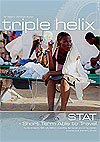NHS cuts: how can we responde?
Juniors, you will staff the NHS of the future. In a time of change, what sort of NHS do you want to work in? We must all recognise the country's financial situation, and seek to follow the Christian mandate to be good stewards of resources. So, how can we respond to the planned cuts? It is still a privilege to be a doctor. Amid frequent tiredness and frustration we have the honour and the adventure of the challenge to follow in the footsteps of the Great Physician, as we encounter so many people and pathogeneses. We face many kinds of battles: against intensive rotas, diagnostic enigmas, difficult examinations, and apathy to the Gospel. It is a point of pride to work for an organisation, and under a regulator, which have great sympathy for biblical mandates – notably the NHS' provision of healthcare regardless of means, and the GMC's directives to value integrity and avoid prejudice.
In this financial recession, we know so many face difficulties with resources and face difficult decisions. As with any important issue we must be thorough in prayer and study to ascertain how to face these challenges, and petition God for the courage to do so.
The spotlight of Scripture
The richness of the Scriptures holds wisdom for every circumstance. (1) It is often forgotten which topic Christ spoke about most – it was not sex or doctrinal harmony, but management of money. Christ's use of the word 'Mammon' (as translated in the King James Version (2)) equates money and avarice with a demonic force, not to be underestimated. This goes hand in hand with God's concern for the poor. Isaiah 58 describes both sharply and eloquently false and true worship, calling us to the 'fast' of breaking yokes such that 'your light will break forth like the dawn'. (3)
The book of Amos has much to say on God's intolerance of social injustice. A repeated theme is the condemnation of nations selling others to slavery: 'because she took captive whole communities'. (4) Soberingly for the message's recipients at the time, the accused included Israel, God's people. Specific concern for the oppressed echoes across the Old Testament; through the books of the Law and the Prophets, through the Psalms and Proverbs. Proverbs 22: 22 states 'Do not exploit the poor because they are poor and do not crush the needy in court'. Memorable, considering the use of '2222' in many Trusts!
The threat is real
No one in the UK can be unaware of the budget cuts prompted by the recession. All the media are now thoroughly engaged in argument, both at local and national level, debating specific cases and ideologies. The threat to many services for the vulnerable is real, both in terms of lost services, reduced funds, and future consequences. We know, for example, that clinical depression occurs in proportion to urban deprivation and perceived helplessness. We must ask ourselves what we can do.
A danger is to demonise politicians and apportion blame. Arguably the most famous politician in history, with his name appearing in the Nicene Creed, is Pontius Pilate. There is much controversy over the reasons for his action of handing Christ to the Jews for execution. Some historians cite that he himself was under threat of execution from Caesar to avoid a further riot in Jerusalem. The truth of why he acted as he did may never be known this side of heaven, but the possibility does add another perspective to the character synonymous with 'washing his hands of the matter' and 'passing the buck'.
Lobbying appointed representatives
With regards to our own MPs, we have a right, and a duty, to voice our opinions and concerns. Their profession is to convey our representation to government, just as patient care is our profession. Until recently I didn't know the name of my local MP. Having learnt it, I can now pray for him and have been inspired to write, and I would encourage others to do the same.
An organisation I have been proud to contribute to is Amnesty International. The mainstay of its petition, the expression of concern in the context of held beliefs, is a powerful one. Politics, of course, is a large and complex field and to give significant time to politics amid on call, family and local church duties will be literally impossible for many. But my resounding hope is that MPs will receive letters from those proudly stating they are Christian doctors, and petitioning for the support of the oppressed. We should maintain hope and continue to pray for justice, not becoming dismayed and disheartened by any perceived apathy.
As an analogy, in the parable of the Sower, the 'scattering' of God's Word is a given; the results, due to the nature of the ground, are not under the sower's control. Likewise we should be quick to declare our faith, and patient to its effect; in all things letting God work in us to 'to will and to act according to his good purpose'. (5)
resources
- Contact your Councillors, MP, MEPs, MSPs, or Northern Ireland, Welsh and London Assembly Members for free: www.writetothem.com
- Join the British Medical Association, if you haven't done so already, and become active: www.bma.org.uk
/_ top /join_bma /index.jsp
Andrew Flatt is an ST3 in Microbiology at University College Hospital, London
































